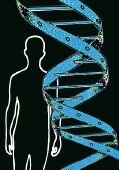- Could Your Grocery Store Meat Be Causing Recurring UTIs?
- Are You Making This Expensive Thermostat Error This Winter?
- Recognizing the Signs of Hypothyroidism
- 10 Strategies to Overcome Insomnia
- Could Artificial Sweeteners Be Aging the Brain Faster?
- Techniques for Soothing Your Nervous System
- Does the Water in Your House Smell Funny? Here’s Why
- Can a Daily Dose of Apple Cider Vinegar Actually Aid Weight Loss?
- 6 Health Beverages That Can Actually Spike Your Blood Sugar
- Treatment Options for Social Anxiety Disorder
Age-Linked Structures on DNA May Also Hint at Cancer Risk


For the first time, researchers have identified a pattern of change in DNA that may signal the development of cancer long before a standard diagnosis can be made.
At issue is the shifting status of telomeres in the blood. Study investigators describe telomeres as protective “caps” on the end of DNA strands. Telomeres have long been viewed as an important indicator of biological age because as people get older telomeres become shorter.
The current study revealed that telomeres start to age at a faster pace than normal in people who eventually develop cancer. The study authors said that telomeres belonging to future cancer patients may shorten in length to such a degree that they resemble telomeres belonging to people 15 years older.
“Understanding this pattern of telomere growth may mean it can be a predictive biomarker for cancer,” study lead author Dr. Lifang Hou, a professor of preventive medicine at Northwestern University Feinberg School of Medicine in Chicago, said in a university news release.
“Because we saw a strong relationship in the pattern across a wide variety of cancers, with the right testing these procedures could be used to eventually diagnose a wide variety of cancers,” Hou said.
The study findings were published recently in EBioMedicine.
In all, the study team spent 13 years tracking telomere measurements among nearly 800 people. Eventually, 135 were diagnosed with a variety of different cancers.
In the end, investigators found that while telomeres notably shortened well in advance of a cancer diagnosis, that shortening process actually came to a stop roughly three to four years before the cancer diagnosis.
Exactly why remains unclear. But the team suggested that the point at which shrinkage halts may coincide with the point at which a patient’s as yet-undiagnosed cancer cells start to take control.
“We saw the inflection point at which rapid telomere shortening stabilizes,” explained Hou. “We found cancer has hijacked the telomere shortening in order to flourish in the body.”
Going forward, the researchers said they hope to identify how this hijacking process unfolds, with the aim of perhaps one day developing treatments that could stop cancer without harming a patient’s healthy cells.
More information
For more on telomeres, visit the U.S. National Library of Medicine.
Source: HealthDay
Copyright © 2026 HealthDay. All rights reserved.










